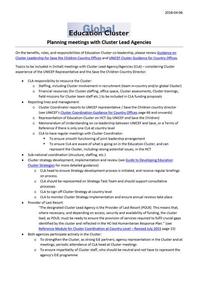Resources
Request support on coordination, information management, capacity development or other education in emergencies areas.
Demande de soutien en coordination, gestion de l’information, développement des capacités et autres domaines de l'éducation en situation d'urgence.
لطلب الدعم في مجال التنسيق ، إدارة المعلومات ، تنمية القدرات أو في اي مجال من مجالات التعليم في مناطق الطوارئ
Solicitar apoyo en coordinación, gestión de la información, desarrollo de capacidades u otra áreas en educación en emergencias.
Featured Resources
below you can find selected tools

COVID-19 Resources
View resources to support education in emergencies coordination during the COVID-19 pandemic.

Guidance on Education Cluster Co-Leadership Arrangements at the Country Level
Indicative Guidance for the establishment and management of co-leadership arrangements at the country level.

Inter-agency Network for Education in Emergencies
For technical education in emergencies resources, please visit the INEE website.
The Protective Role of Education in Emergencies
This framing paper discusses why education is critical, in that it provides essential protection, dignity and development of children and youth in crisis
- Communicaiton: Communication Materials
- Coordination: Advocacy
- Technical Areas: Protection
Review of Localisation in Coordination in Somalia –Education Cluster
This report provides a summary of the observations, analyses and recommendations that were compiled by the Global CP AoR, Global Education Cluster and Somalia Education Cluster.
- Coordination: Coordination, Knowledge Mangement, Leadership
- Emergency: Conflict, Complex, Drought, Floods
- Technical Areas: Localisation, Protection
Planning Meetings with Cluster Lead Agencies
This document contains guidance around topics that should be included in (initial) meetings with Cluster Lead Agency/Agencies (CLA) – considering Cluster experience of the UNICEF Representative and the Save the Children Country Director:
- Coordination: Coordination, Cluster Management, Leadership
- HPC: Strategic Planning
Guide to Education in Emergencies Needs Assessments
The purpose of the Guide and Needs Assessment Packages to provide practical, relevant guidance and resources to education in emergencies (EiE) coordination staff conducting, coordinating and participating in secondary data reviews and joint, harmonized and/or multi-sector needs assessments.
- Coordination: Needs Assessment, Inter-Sector Coordination
- HPC: Needs Assessment & Analysis
- Technical Areas: Accountability to Affected Populaiton, Localisation
Guide to Developing Education Cluster Strategies
The purpose of this Guide and accompanying Strategy Package is to provide practical, relevant guidance and resources to education in emergencies (EiE) coordination staff on how to develop and update an Education Cluster Strategy.
- Coordination: Cluster Strategy, Inter-Sector Coordination
- HPC: Strategic Planning
- Technical Areas: Accountability to Affected Populaiton, Localisation
Cluster Education Tchad Termes de Référence
In order to provide a coordinated response in accordance with the humanitarian reform and especially the guidelines of the Permanent Inter Agency Committee (IASC), the cluster approach was active in Chad including the education cluster. It aims to ensure a logical and effective preparation and…
- Coordination: Coordination, Cluster Management, Leadership
- Emergency: Conflict, Displacement
The Short Guide to Rapid Joint Education Needs Assessments
The Short Guide is a stand-alone reference tool to help you plan and conduct a rapid joint needs assessment. You can also use it in situations where there are no clusters and education is coordinated through a sector working group.
- Coordination: Needs Assessment, Inter-Sector Coordination
- HPC: Needs Assessment & Analysis
Petit Guide des Evaluations Rapides Conjointes des Besoins en matière d’Education
Le Petit Guide est un outil de référence indépendant destiné à vous aider à planifier et à réaliser une évaluation rapide conjointe des besoins. Vous pouvez également vous en servir lorsque l’éducation est coordonnée par un groupe de travail de secteur.
- Coordination: Needs Assessment, Inter-Sector Coordination
- HPC: Needs Assessment & Analysis
Manuel du Coordinateur du Cluster Éducation
Ce manuel vise à fournir aux Coordinateurs du Cluster Éducation des informations qui les guideront et les aideront à faciliter une réponse prévisible, coordonnée et efficace aux besoins d’éducation dans les situations d’urgence.
- Coordination: Coordination, Cluster Management, Inter-Sector Coordination, Leadership
- HPC: Implementation & Monitoring, Needs Assessment & Analysis, Operational Peer Review and Evaluation, Resource Mobilisation, Strategic Planning
- Technical Areas: Accountability to Affected Populaiton
Joint Education Needs Assessment Toolkit
This toolkit provides robust guidance for conducting joint needs assessments in the first weeks and months of an emergency. This toolkit is divided into four parts: I) guidance; II) modules; III) tools; and IV) annexes. This toolkit accompanies RJENA
- Coordination: Needs Assessment, Inter-Sector Coordination
- HPC: Needs Assessment & Analysis
Filter results
Communication(selected )
Coordination(selected )
Country(selected )
Emergency(selected )
Humanitarian Programme Cycle(selected )
Language(selected )
Publication Date(selected )
Publisher(selected )
Resource Type(selected )
Technical Areas(selected )
Can’t find what you’re looking for?
Contact your relevant language Help Desk










